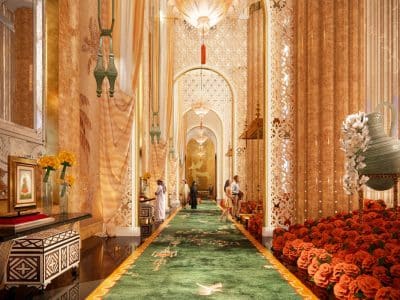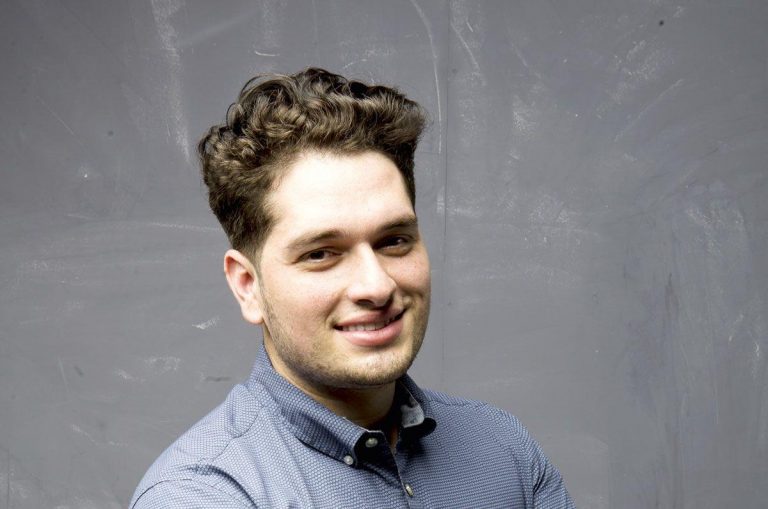A rose that lives forever without sun or water sounds like something out of a Disney motion picture. But thanks to Ebraheem Al Samadi, it is a luxury gift you can pick up from several locations across the Middle East — or have it delivered, if you like.
We are talking about the 28-year-old Kuwaiti-American millionaire and his brainchild Forever Rose — provider of the world’s longest-lasting roses, which allegedly survive for, well, not quite forever, but several years.
To be entirely fair, the concept was created in 1999 in London as a family-owned events house supplying lifelong roses to royal palaces such as London’s Buckingham Palace and Brussels’ Egmont Palace. But besides royalty, few knew of the otherworldly creations — until Al Samadi came along.
In 2015, he bought the company, which then had about $1.2m worth of annual revenue, upon hearing of the concept while on a trip to London. He figured he could take it beyond the walls of the royal palaces and into the hands of rich Middle Eastern Arabs.
He did a little more than that, nurturing Forever Rose into a multi-million dollar luxury empire worth over $21m — in less than a year.
Now based in the UAE, the company has a growth rate of 35 percent month-on-month, with seven shops across the Middle East and more in the pipeline in London, Los Angeles, Paris, Kuwait and Qatar, and 15 in Saudi Arabia alone.
But its growth will not be trimmed there. By 2018, the brand expects to open its first boutique hotel in London, followed by one in Dubai in 2020 and another in Doha in 2022, with a total investment of more than $43m. It has also announced plans to launch its first Forever Rose Café in Riyadh this December.
But how did Al Samadi do it? By skipping the marketing and relying on word of mouth, starting with elite Abu Dhabi families, who “when one came in, [he] brought three back”, Al Samadi says.
But the flowers themselves were the real moneymakers.
“Just like everyone knows that the best chocolates come from Belgium, the best roses come from Ecuador,” Al Samadi tells Arabian Business.

The young millionaire explains that Ecuador’s volcanic mountains result in thicker soil and richer nourishment for roses, helping the flowers to grow larger while being more aesthetically pleasing than roses grown elsewhere.
The ‘forever’ part however, comes from a less natural formula.
“The founders of Forever Rose worked with the farmers in Ecuador to develop a formula that can keep the rose preserved, in a way. We don’t really tell customers it’s preserved, because it’s more of a technical word for it. We tell them it’s naturally enhanced — and it’s the truth. The preservative that’s used is a natural enhancer that allows the rose to retain its beauty and live for three to four years without water and sunlight,” he says.
“The rose is placed inside a glass dome to protect it from being touched. It damages the rose when people touch it — they forget that it’s [still] a natural rose. We [say] three years because we want to be realistic with the customers. So people can say ten, 20 years — nothing is forever. We say take it and see how long it lasts,” explains Al Samadi, adding that none of the flowers he’s created have so far died.
“Some have been destroyed by humans,” he says laughing, “but none have died. In my house, I have a collection of roses that has been with me for over three years. The roses don’t even have a crack on them.”
So why the ‘forever’ branding then? Al Samadi says the name refers to the rose being the “forever choice of flower for women”.
Given the competition and saturation in the UAE market, most people are more puzzled with Al Samadi’s choice of location than the brand name, particularly as he chose to move it from one of the world’s biggest markets: London.
He says the relocation was made partly in a bid to get in touch with his Arabian heritage.
“I left Kuwait to go to the [United] States when I was two years old. Because I wasn’t an Arabic speaker, my father tried to encourage me to learn the language. So I used to wake up every day and watch Dubai TV. I was just really impressed by it. It seemed like every day a new road, something new, opened. [Conversely,] I went back to Orlando last week, and in 13 years [since visiting the city], nothing has changed. Nothing. It put me in shock, because in Dubai every day something new is happening. It was a door of opportunities; I didn’t care where it was, I just wanted to be a part of it,” he says.
But he who dares not grasp the thorn should never crave the rose. And the thorns came in the shape of challenges.

One such challenge was educating the market on the product.
“Bringing it into Dubai Airport, they were like, what is this? Is it natural or is it not? If it’s natural, how can it live without water? So we had to explain everything to them and they had to examine it,” Al Samadi says.
Fortunate for him, the roses passed the customs’ tests with flying colours, and the first Forever Rose shop was launched on Abu Dhabi Corniche in 2015. By then, another challenge had risen.
“In Abu Dhabi, because we opened at a free-standing location, not in a mall, we did not have foot traffic. But because our product was different, we started off our first month’s sale in Abu Dhabi with something like AED300,000 ($81,700),” he says.
“For us, it was really bad for all the effort we put into the brand. I told my team not to worry about sales. I revoked the right for management to see sales. I revoked the rights for all the employees to see the sales. I said ‘do not worry about the sales, worry about customer service’.
“The next month, we increased [our sales by] 35 percent, then another 35 percent, and again 35 percent. So for 2015, from January to December we nearly made AED30m [$8.2m] from one shop in Abu Dhabi and one shop in Mercato, which opened in December that year,” he says.
The brand’s other locations are not less impressive either. Other spots include Yas Mall and The Galleria Mall in Abu Dhabi, where Forever Rose’s neighbours will include high-end retailers such as Gucci and Prada.
“Most customers buy products from there and package them with us. So they buy a ring from Cartier and come put it inside the rose and they have the full package,” says Al Samadi, who adds luxury items to his long-lasting rose portfolio, including high-end perfumes, chocolate, and diamond jewellery.
The products are not the only high-end aspect of Forever Rose, however. Everything from its shops to its smaller kiosks are glamour.
“We manufacture our kiosks in Dubai. Our partners that do our kiosks are the same designers and manufacturers behind brands like Burberry and Christian Louboutin. They are able to produce me a kiosk, 4 x 5 metres, within 14 days,” he says.

That fast manufacturing also has enabled Forever Rose to bloom so fast.
“At the moment, [we’re] riding a train that’s getting faster and faster and not stopping and we don’t know where it’s going. All we know is that it’s going to a brighter place,” Al Samadi says.
Competition is not on the young entrepreneur’s mind, either.
“We never look at what our so-called competitors are doing, because we focus on what we need to do, not what they’re doing. A lot of companies fail because they look at what their competitors are doing rather than what they are doing. For me, competitors are a sign of negativity. But that doesn’t mean that we have to be completely ignorant, we are aware of their existence, but we don’t really focus on it. So from 100 percent, I probably only care 5 percent,” Al Samadi says.
Meanwhile, Forever Rose is not Al Samadi’s only moneymaker. The brand is just one of many that fall under his multi-brand business Al Samadi Group, which he established in 2010 after moving to Dubai.
Under its umbrella, the group holds restaurant brands Big Smoke Burger and The Chickery, both located in Dubai’s Jumeirah district, as well as the Middle East retail rights for Amika hair products, Wired Up jewellery, Juicy hair products and My Trends, a hub for trends in the market.
According to Al Samadi, the group has grown 25 percent year-on-year from 2010 to 2016.
But Forever Rose remains the centre of focus for growth in the near future, he says.
“A lot of our revenues have gone to opening Al Samadi restaurants, as Al Samadi has never and will never take any loan from any bank in the world,” he says. “We are self-funded and we believe that if we don’t have it, we don’t buy it. It’s as simple as that. Don’t spend what’s not yours. It’s funny because people go for loans thinking it’s free money. You have to pay it back. We don’t play with that.”
And as intriguing as his million-dollar business is, his own story makes it all the more fascinating. For one, he started business when he was just 13 years old.

Following his parents’ separation at the young age, Al Samadi took it upon himself to provide for his mother and sister.
“It began as my mother telling me you have too many clothes, you don’t need all that. So I said ‘okay’. I heard about this website called E-bay and I listed jeans that I had and I never wore. I sold it for more than I purchased it for. It was a pair of Levi’s jeans that I bought for $10 and sold for $20. So I went to the store with the $20 I made and purchased two jeans. And those jeans came into four and those came into eight and it kept going until I started my own home business with a brand called Marshalls that sells off-season brands,” he says.
“I had a very good understanding at a young age of what to sell to who. For example, if it was a luxury children’s brand, an American market didn’t understand luxury children’s wear because they said there’s no reason to spend so much on something that they’re going to outgrow. Whereas for Europe, it’s a phenomenon to dress your children in Dior or in expensive brands because they think it’s cute. So I took the products from the States and sold it in France. So I had an international trading experience at a very young age,” he says.
There was a bump in the road, however. In the US, under child labour law, children under 18 years old were not allowed to work over 20 hours a week.
“I told my mother I couldn’t work and go to school — it would be very difficult. So I decided to write a letter to the senator of Florida requesting for me to test for my high school diploma. I wrote to him explaining that I am the only provider for my mother and my sister and that I needed to work more hours. I asked for a waiver. Two months later, the senator replied and said ‘no problem’. I did the test and passed with flying colours. They mailed me my high school diploma and I was able to work full-time,” he says.
Twenty hours a week turned to 80 hours as Al Samadi worked three jobs at once, first for an entertainment dining company selling — you guessed it — roses.
“Believe it or not, I sold lit-up roses to romantic couples who would come in. And I was the number one salesman because I knew how to approach the men to buy the flowers for their wives. It was a plastic lit-up flower with a battery, but at night it looked really nice,” he says.
Ever keen to make a mint, Al Samadi also worked as a lifeguard for Nickelodeon family suites and then as a cashier at a gift shop.

But even as a cashier, he was breaking records.
“I got promoted in the same company to be assistant luggage buyer. That’s where I took my experience of buying products abroad and bringing them to the country. And the reason I was good at it is because I always questioned everything. Nothing could pass by me before me asking ‘why did that happen?’
“For example, I would always question why the luggage section in our department store was not performing. I said, ‘let’s do something’. So I took all the luggage and filled it with newspapers to show the customers the size of the bags. And that brought up sales by 20 percent. That’s when the buyer for the luggage department decided to take me to the corporate office, and I became assistant luggage buyer and visual merchandiser for almost nine months.”
By the age of 17, the high school graduate had gathered enough capital to start his first company, EHA LLC, which imported roller skates from China and California and sold them throughout kiosks in Florida. It opened in nine locations in the span of one year.
EHA LLC closed down nearly two years later after the trend had died out. Al Samadi insists the closure helped him with the launch of Forever Rose.
“It taught me not to take advantage of a trend in the wrong way. You can ride a wave until it is dead, or you can continue in the market with a brand that deserves its name,” he says.
Placing his hands on the glass table in front of him, Al Samadi’s wrist shows a small-sized Rolex watch that he tells Arabian Business he bought at 17.
“I didn’t buy it with daddy’s money. I didn’t open my company with daddy’s money. It was all my own hard work. And I bought it to remind myself that hard work pays off,” he says, adding that he is a fan of watches because they ‘tell the story of a man’s life’.
We reckon that if watches could talk, Al Samadi’s would tell the story of a young boy whose life threw at him responsibilities most 13-year-olds could not handle. Instead of sending up a white flag, he worked his fingers to the bone to finally lay in a bed of roses — roses that we hope will last forever.








